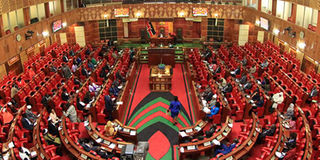2022 elections played role in revision of sugar report

MPs debate the gender bill on November 21, 2018. MPs were accused of taking bribes to throw out a report on sugar. PHOTO | JEFF ANGOTE | NATION MEDIA GROUP
What you need to know:
- Duale said those who made the allegations failed to submit evidence before the House committee.
- The DCI and EACC now have 90 days to initiate investigations into the bribery allegations that rocked Parliament in August.
Fear of being barred to vie in the 2022 General Election on integrity grounds by the anti-graft body played a major role in the amendment of the bribery report by lawmakers.
MPs, while adopting the report by the Powers and Privileges Committee, called on the Directorate of Criminal Investigations (DCI) and Ethics and Anti-Corruption Commission (EACC) not to investigate all 349 MPs but only those who claimed some of them were bribed.
Majority Leader Aden Duale expressed concern that allowing a probe on all MPs might lead to some members not being cleared by EACC in 2022.
“This is a serious matter Mr Speaker, allowing other agencies to investigate members can drag to 2022 and some MPs might not be cleared to vie for elections,” Mr Duale said.
EVIDENCE
Mr Duale said it is not proper to indict the entire House over bribery yet those who made the allegations failed to provide evidence before the House committee.
“Let the people who made the allegations go to DCI and EACC as ordinary Kenyans and give evidence, but you cannot indict 349 MPs, including the Speaker, with no evidence,” Mr Duale said.
Following the adoption of the report, DCI and EACC now have 90 days to initiate investigations into the bribery allegations that rocked Parliament in August during the rejection of the sugar report by a joint parliamentary Trade and Agriculture Committee.
It is alleged that MPs received as little as Sh10,000 to shoot down the report.
RECANTED
However, the two investigative agencies may not nail down MPs who received bribes to shoot down the sugar report due to glaring gaps that exist in a report tabled in the House last week.
The report by the Powers and Privileges Committee was not clear on who received or gave out the bribe, although it indicated that the lawmakers might have been bribed to reject the report and called on the EACC and DCI to investigate further the claims.
The agencies will also face an uphill task to find evidence from the MPs who made allegations that their colleagues were bribed as nearly all of them recanted their assertions, saying they made the remarks out of emotion.
According to the report, a review of the footage of the House proceedings of August 9 by the Parliamentary Broadcasting Unit did not reveal any exchange of envelopes or money in the chamber as claimed by Kiminini MP Didmus Barasa.




